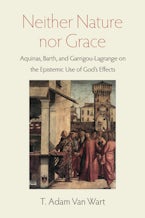- Home
- religion
- philosophy
- Neither Nature nor Grace
Preparing your PDF for download...
There was a problem with your download, please contact the server administrator.
Neither Nature nor Grace
Aquinas, Barth, and Garrigou-Lagrange on the Epistemic Use of God’s Effects
Imprint: Catholic University of America Press
Neither Nature nor Grace operates at the intersection of systematic and philosophical theology, exploring in particular how St. Thomas Aquinas variously uses the latter in service to the clarification and faithful advancement of the former. More specifically, Neither Nature nor Grace explores the overlooked logical difficulties that have followed the late modern debates in ecumenical Christian theology as to whether knowledge of God is available solely through God’s gracious self-revelation (e.g., Jesus Christ and Holy Scripture), or through revelation and the deliverances of natural reason. Van Wart takes the prominent French Dominican Reginald Garrigou-Lagrange as paradigmatic for the case that knowledge of God can be had by both revelation and natural reason. Representing the opposing position, that God can only be known through divine revelation, Van Wart highlights the work of influential Protestant theologian Karl Barth. By placing these two imposing 20th century theologians in conversation, and by providing a careful theo-philosophical analysis of the logical mechanics of each thinker’s respective arguments, Van Wart shows how both inadvertently overreach their self-professed epistemological bounds and just so run into significant problems maintaining the coherence of their relative theological positions. That is, against their expressed intentions to the contrary, both thinkers unwittingly evacuate the divine essence of the mystery Christian tradition has always previously claimed it to have, effectively reducing the being of God to mere creaturely being writ large. As a contrasting corrective to this problem, Van Wart proffers a constructive grammatical reading of Aquinas’s measured account of the crucial but often overlooked logical differences between what can be said of the divine, on the one hand, versus what can be known of God, on the other. While many recent works have attempted to solve the ongoing arguments which Garrigou-Lagrange and Barth epitomize regarding the epistemic use of God’s effects, Van Wart’s contribution constructively pushes the conversation to a different level in showing how Aquinas’s grammar of God provides a salutary means of dissolving and moving beyond these contentious debates altogether.
T. Adam Van Wart is assistant professor of theology at Ave Maria University.
"Van Wart’s book will stimulate much thought on the question of theology in a post-metaphysical context. It is a work that merits a wider audience."
~Gary Culpepper, Providence College
"Theology is nothing if it is not constantly thinking about God. And yet, can theologians really say anything about God that has real purchase? How can finite minds know that which infinitely exceeds finite minds? T. Adam Van Wart wades into this debate with eloquence and grace, reminding us how utterly crucial this topic is. Both those who agree with his Grammatical Thomism and those who disagree strongly will benefit from this stimulating book."
~Matthew Levering, James N. and Mary D. Perry Jr. Chair of Theology, Mundelein Seminary
"How can we truly know God? To this question, so pressing to modern Catholic and Protestant theology alike, T. Adam Van Wart offers a truly provocative anser. He contests both of the basic modern approaches to the question - that we first know God by nature, from creation, or by grace, in Christ alone - which are often thought to be utter opposites that exhaust the alternatives available to us. Not so, this book argues. They are in fact two sides of the same coin and alike unsatisfactory. Thomas Aquinas offers a genuinely different and much better answer, but to see that we have to read him quite otherwise than he has usually been taken in modernity by either friend or foe. This book is a stimulating challenge to do just that."
~Bruce D. Marshall, Southern Methodist University

